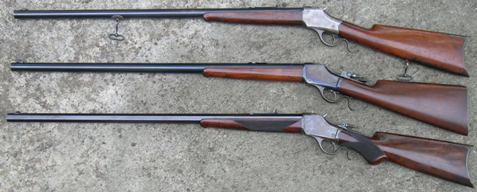clarence said If the factory was not doing something like that, the special designation wasn’t merely a marketing ploy, it was something like fraud.
Call it what you want to but it is a simple case of math and of the records of what was produced to determine that the 10f1000s and 1of100s were not as advertised. One out every 1000 barrels was not set a side and made into a 1of1000. One out of every 100 barrels was not set a side and made into a 10f100.
Go look at the standard production numbers of the 73 for each year and when compared to the 1of1000s made. The math simply doesn’t add up as advertised. For example in the year1875 they produced (25) 1of1000s out of the total year production of 6730 model 73s. They made zero 1of100s in 1875. Was not until 1876 they made some 1of100s, and they only produced a total of 8 throughout production. Winchester did not reject 25,000 barrels in 1875 to produce 25 guns when production was only 6730, which includes the 1of1000s made.
All they basically did was take standard barrel stock out of a pile and engrave the words or in aerial form the 1of1000 marking and on some added other special order features. But the early aerial 1of1000 are identical to a standard rifle but with a set trigger and barrel marking and that is it. As far as “targeting” goes to best I recall there is nothing noted in the ledgers for any of the 1of1000s. The ledger heading for Target is blank and that the warehouse ledgers are blank after serial #1856, well before production of the 1of1000.
In the 1870s how would one go about accusing a rifle manufacturing company of fraud?
Sincerely,
Maverick
![]()
WACA #8783 - Checkout my Reloading Tool Survey!
https://winchestercollector.org/forum/winchester-research-surveys/winchester-reloading-tool-survey/
Maverick said In the 1870s how would one go about accusing a rifle manufacturing company of fraud?
No legal restrictions on false or deceptive advertising until well into 20th C., & even today most advertisers get away with what ought to be considered fraud; for ex., the claims for most over-the-counter pain meds, utterly worthless, such as the Salonpas patches I recently tried for back pain. Why do people continue to buy them? Desperation, combined with the placebo effect. Most stores will refund the customer’s money if he takes the trouble to complain, but that requires calling in the store manager.
I’m sure the Winchester ad dept was careful to avoid any claim that could easily be disproved, such as a standard of accuracy. No accuracy claim was made even for Model 70 match rifles.
Winchester’s practice of recording the target in the ledger on 1873’s, ended at serial number 1856 with only a few hundred entries. They probably realized it wasn’t good marketing practice. Today those guns command a premium with collectors. The 1 of 1000 rifle came along later but suffered the same fate. Today those guns command a huge premium because they are rare and Hollywood did the movie.
Accuracy claims are all part of marketing. Take ammo, match grade primers, bullets, and ammunition all command a premium price with no claim other than quality upgrade. Just think if match grade ammo manufacturer would test fire three rounds out of a box and if that box was really accurate sell it for a premium. That marketing concept seems foolish to me, but maybe not to Winchester in 1875. T/R
Hello Bob,
Yes, I believe that you are incorrect in that line of thinking. American Black Walnut does not swell unless exposed to a substantial amount of water or steam. Conversely, it does not shrink unless exposed to harsh climate.
As manufactured by Winchester, the stocks should always stand slightly proud of the butt plates.
Bert
WACA Historian & Board of Director Member #6571L

1 Guest(s)


 Log In
Log In Members
Members Home
Home

 Add Reply
Add Reply Add Topic
Add Topic
 Online
Online


 Offline
Offline

